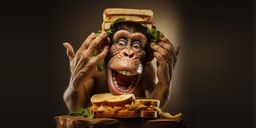Monkey sandwich stories in proposals: deal breaker
In the world of sales, proposals are a crucial part of the process. It is the moment when potential customers get a first or second impression of your organization and the services or products you offer. Then of course you won't come along with a few monkey stories. But you could be wrong about that...

What is a monkey story?
A "monkey story" is an expression we use to describe a fabricated, untrue or exaggerated story that is presented as the truth or fact. Sandwich monkey stories are usually sensational, sensational or bizarre. The concept of a monkey story occurs worldwide and is characterized by its rapid spread because people often like to share interesting, crazy or shocking stories. Social media is chock full of it. Now better known as hoaxes. They range from harmless and funny to harmful and misleading, such as false health advice or conspiracy theories. And yes, monkey stories also appear in proposals. That's what this blog is about.
Urban legends in proposals
In a proposal you want to convince a customer and win over them, so you do everything you can to achieve that. All in all? Yes, but without losing sight of reality. Sandwich stories in proposals are usually strong statements or unrealistic promises. You will immediately recognize some because they are too funny: "We will give you the gift voucher for the hairdresser for free, because our productivity software is so good that it will even make your hair grow.” Or, in the context of vitality in the workplace: "Thanks to the automatic snack recognition, the refrigerators open exclusively for healthy snacks." Ha ha, Reminds me of organizations that want to mislead you on social media with a semi-believable April Fool's joke!
However, there are also claims and promises that could be quite credible at first glance. A few examples:
- the proposal states extremely lower prices, much lower than those of the competition (this is usually also stated) and often without clear substantiation;
- mega fast delivery times;
- listing the great qualities of products without evidence (think indestructible or unique);
- listing the benefits or savings of certain services without (too much) evidence;
- offering extended warranties without clear terms or supporting documentation.
Monkey stories in proposals are more harmful than you think
The use of monkey tactics in proposals may produce occasional success, but in the long term it is downright harmful. Exaggerated and incorrect statements and/or claims that are presented as the truth lead to reputational damage. Companies that use monkey stories in their proposals or sales process can count on distrust that is not easily overcome.
No trust is a hard deal breaker and... it spreads like wildfire. Moreover, the monkey stories are often persistent. Companies warn other companies to protect them from unreliable collaborations. You can suffer from it for years. Building trust is slow, but losing it is very fast.
Do you regularly make proposals? Then, no matter how tempting it can sometimes be, stay as far away from those monkey stories as possible, I would say.
Testimonials describe what has been, and are a promise of what is to come - Ron Kaufman
It is therefore much better to:
- substantiate and support your claims, assertions and promises with facts, figures or references; you show why your product or service is worthwhile;
- to remain realistic and be honest about your boundaries;
- to be clear about guarantees, agreements and to offer these to the customer together with clear conditions and documentation;
- adding references, testimonials and reviews, because these types of customer stories do add value.
Trust is also a valuable asset in the business world. In the long term, this ensures loyal customers and a strong reputation.
Related articles
Everything about proposals and why they are important to your business. Read detailed information and learn how to write and design better proposals.
Want to write about the history of the proposal? Of course! I immediately saw it in front of me: a guy who makes something out of a proposal using cuneiform script. Yes, there is no shortage of imagination. Afterwards, I don't even seem to be wrong that much, but more about that later. Making a proposal over time shows a significant evolution.
No one can have missed it. For months, ChatGPT dominated the news and social media. We were presented with everything. Arguments for and against, possibilities and impossibilities, enthusiasm and fear. As you can imagine, as a content writer, I followed the discussions closely. In addition, I answered clients' questions, published a candid blog and now here on the Offorte website. And with pleasure, because: Is it smart or stupid to use ChatGPT when making proposals? is an interesting question. Read on to discover the pros and cons that may help you decide whether or not to use ChatGPT for proposals.
The sales conversation and the proposal are the perfect moments to convince the customer or prospect that working with you (as reliable experts) is the best option. Fine, so far so good. But… don't overdo it make sure you present your company in the right place and in the right way.
Large, corporate organizations generally like to do business with peers. Nevertheless, more and more partnerships are being concluded with smaller companies and/or startups. This allows these large organizations to innovate faster. Smaller companies and startups in turn benefit from the knowledge, facilities and network of corporate organizations. This allows them to develop or grow better and faster. Great, that all looks good. However, corporates speak each other's language, but a 'smaller entrepreneur' had better prepare well in advance, also with regard to proposals. What can you take into account and what are the essentials in a proposal for large organizations? I did some research and listed a few things for you.
Start closing more deals with smarter proposals
Try Offorte free for 14 days - no credit card needed
